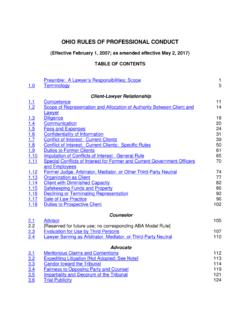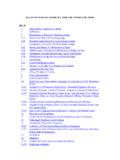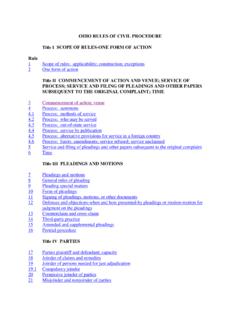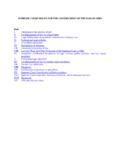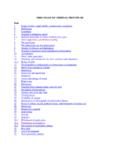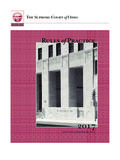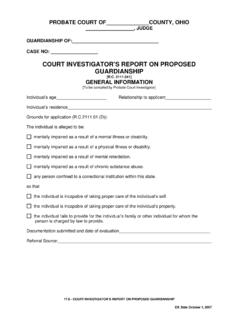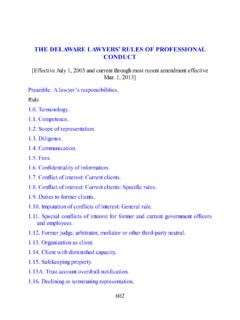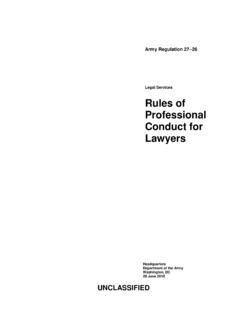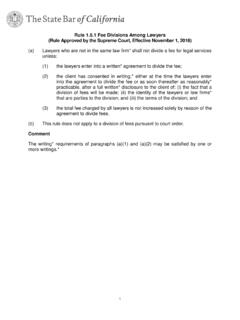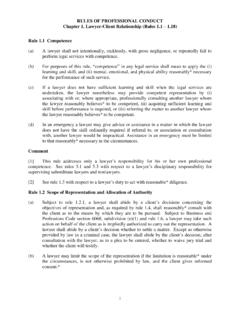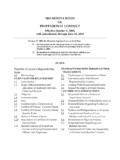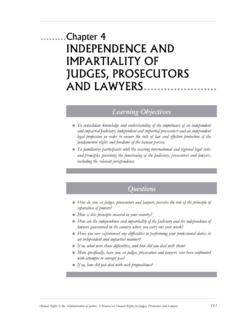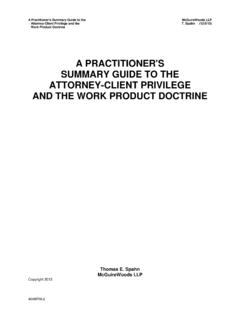Transcription of Ohio Rules of Professional Conduct
1 OHIO Rules OF Professional Conduct (Effective February 1, 2007; as amended effective May 2, 2017) TABLE OF CONTENTS Preamble: A Lawyer s Responsibilities; Scope 1 Terminology 5 Client-Lawyer Relationship Competence 11 Scope of Representation and Allocation of Authority Between Client and Lawyer 14 Diligence 18 Communication 20 Fees and Expenses 24 Confidentiality of Information 31 Conflict of Interest: Current Clients 39 Conflict of Interest: Current Clients: Specific Rules 50 Duties to Former Clients 61 Imputation of Conflicts of Interest.
2 General Rule 65 Special Conflicts of Interest for Former and Current Government Officers and Employees 70 Former Judge, Arbitrator, Mediator, or Other Third-Party Neutral 74 Organization as Client 77 Client with Diminished Capacity 82 Safekeeping Funds and Property 86 Declining or Terminating Representation 92 Sale of Law Practice 96 Duties to Prospective Client 102 Counselor Advisor 105 [Reserved for future use; no corresponding ABA Model Rule] Evaluation for Use by Third Persons 107 Lawyer Serving as Arbitrator, Mediator, or Third-Party Neutral 110 Advocate Meritorious Claims and Contentions 112 Expediting Litigation [Not Adopted.]
3 See Note] 113 Candor toward the Tribunal 114 Fairness to Opposing Party and Counsel 119 Impartiality and Decorum of the Tribunal 121 Trial Publicity 124 Lawyer as Witness 127 Special Responsibilities of a Prosecutor 130 Advocate in Nonadjudicative Proceedings 132 Transactions with Persons Other Than Clients Truthfulness in Statements to Others 133 Communication with Person Represented by Counsel 135 Dealing with Unrepresented Person 137 Respect for Rights of Third Persons 139 Law Firms and
4 Associations Responsibilities of Partners, Managers, and Supervisory lawyers 141 Responsibilities of a Subordinate Lawyer 143 Responsibilities Regarding Nonlawyer Assistants 144 Professional Independence of a Lawyer 146 Unauthorized Practice of Law; Multijurisdictional Practice of Law 148 Restrictions on Right to Practice 154 Responsibilities Regarding Law-Related Services 155 Public Service Voluntary Pro Bono Publico Service [Action Deferred; See Note] 159 Accepting Appointments 160 Membership in Legal Services Organization [Not Adopted; See Note] 161 Law Reform Activities Affecting Client Interests [Not Adopted.]
5 See Note] 162 Nonprofit and Court-Annexed Limited Legal Services Programs 163 Information About Legal Services Communications Concerning a Lawyer s Services 165 Advertising and Recommendation of Professional Employment 167 Solicitation of Clients 170 Communication of Fields of Practice and Specialization 176 Firm Names and Letterheads 178 Political Contributions to Obtain Government Legal Engagements or Appointments by Judges [Not Adopted; See Note] 180 Maintaining the Integrity of the Profession Bar Admission and Disciplinary Matters 181 Judicial Officials 183 Reporting Professional Misconduct 185 Misconduct 187 Disciplinary Authority.
6 Choice of Law 189 Form of Citation, Effective Date, and Application 192 Note: Except for Latin terms, words and phrases that appear in italicized type in each rule denote terms that are defined in Rule PREAMBLE: A LAWYER S RESPONSIBILITIES [1] As an officer of the court, a lawyer not only represents clients but has a special responsibility for the quality of justice. [2] In representing clients, a lawyer performs various functions. As advisor, a lawyer provides a client with an informed understanding of the client s legal rights and obligations and explains their practical implications.
7 As advocate, a lawyer asserts the client s position under the Rules of the adversary system. As negotiator, a lawyer seeks a result advantageous to the client and consistent with requirements of honest dealings with others. As an evaluator, a lawyer examines a client s legal affairs and reports about them to the client or to others. [3] In addition to these representational functions, a lawyer may serve as a third-party neutral, a nonrepresentational role helping the parties to resolve a dispute or other matter.
8 See, , Rules and In addition, there are Rules that apply to lawyers who are not active in the practice of law or to practicing lawyers even when they are acting in a nonprofessional capacity. For example, a lawyer who commits fraud in the Conduct of a business is subject to discipline for engaging in Conduct involving dishonesty, fraud, deceit, or misrepresentation. See Rule [4] In all Professional functions a lawyer should be competent, prompt, diligent, and loyal.
9 A lawyer should maintain communication with a client concerning the representation. A lawyer should keep in confidence information relating to representation of a client except so far as disclosure is required or permitted by the Ohio Rules of Professional Conduct or other law. [5] lawyers play a vital role in the preservation of society. A lawyer s Conduct should conform to the requirements of the law, both in Professional service to clients and in the lawyer s business and personal affairs.
10 A lawyer should use the law s procedures only for legitimate purposes and not to harass or intimidate others. A lawyer should demonstrate respect for the legal system and for those who serve it, including judges, other lawyers , and public officials. Adjudicatory officials, not being wholly free to defend themselves, are entitled to receive the support of the bar against unjustified criticism. Although a lawyer, as a citizen, has a right to criticize such officials, the lawyer should do so with restraint and avoid intemperate statements that tend to lessen public confidence in the legal system.
